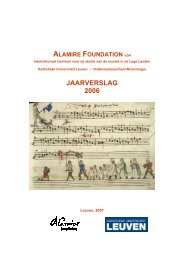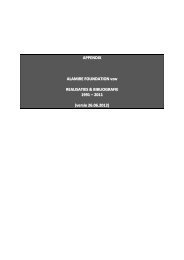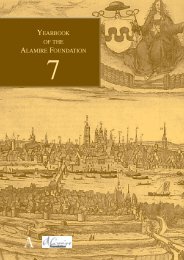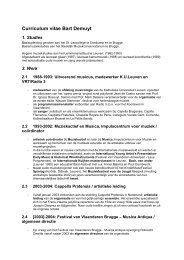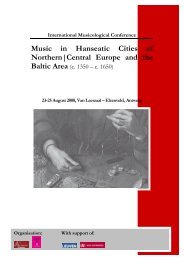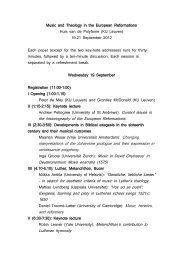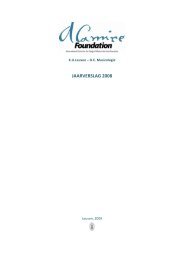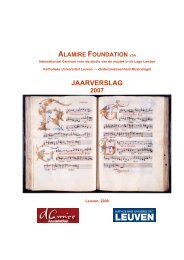YEARBOOK OF THE ALAMIRE FOUNDATION
YEARBOOK OF THE ALAMIRE FOUNDATION
YEARBOOK OF THE ALAMIRE FOUNDATION
You also want an ePaper? Increase the reach of your titles
YUMPU automatically turns print PDFs into web optimized ePapers that Google loves.
168 RICHARD FREEDMAN<br />
Authorial control is identified not with profit, but with the public good. Ronsard’s<br />
works, like the royal patents that protect them are freely ‘given’ to society at large.<br />
During the sixteenth century, as Natalie Zemon Davis has recently argued, printed<br />
books were poised at the intersection of two kinds of transactions, one hidden within<br />
the other. Title pages of printed works stress the commercial aspects of the object,<br />
such as the bookseller’s address, the existence of an official patent protecting the<br />
printer against pirate editions, or the utility or novelty of the book as an appeal to<br />
prospective buyers. In contrast, texts of dedications (which appear inside the covers)<br />
frame the author or editor of a work as one who freely ‘gives’ his intellectual labor<br />
to the reader, patron, or public. 22 The world of printing, with its earnest commercial<br />
claims of materials, physical labor, and profit, clearly manifests itself in privileges<br />
of protection from undue competition. But the domain of authorship long remained<br />
isolated from modern preoccupations with intellectual property as capital that are so<br />
familiar to us today (with suits over who owns music, software, and even genetic<br />
information). Echoing a long intellectual tradition that understood knowledge as a<br />
gift from God, the authorial privileges held by Ronsard and Lasso limn a delicate<br />
space between the demands of an increasingly commercial world (on one hand) and<br />
the public uses of learning (on the other). Elements of this dynamic appear in the text<br />
of a treaty recently concluded by the World Intellectual Property Organization in<br />
Geneva (from 1996). Participants agreed that, while the producers of sound recordings<br />
had the right to control how and when such material would be distributed, performing<br />
artists themselves retained a ‘moral’right to make certain that their recorded<br />
performances were not distorted, mutilated, or modified in ways that would be prejudicial<br />
to their reputations. Setting aside any question of the economic aspects of<br />
sound recording, this body saw fit to recognize that creators retain a permanent right<br />
to assure the integrity of their ideas. 23 A related tension, by the way, persists in current<br />
debates about the ownership of academic research. As scholars, we ‘give away’<br />
our ideas, just as institutions ‘grant’tenure and other forms of prestige. Is our research<br />
‘work’? Can it be sold? Do we reserve a ‘moral’ right of ownership that permits us<br />
to govern how and in what forms it is disseminated? 24<br />
22 N.Z. DAVIS, The Gift in Sixteenth-Century France, Madison, Wisconsin, 2000, p. 46.<br />
23 Article 5 (Moral Rights of Performers) of the World Intellectual Property Organization (WIPO)<br />
Performances and Phonograms Treaty of 23 December 1996, reads, in part: “Independently of a performer’s<br />
economic rights, and even after the transfer of those rights, the performer shall, as regards<br />
his live aural performances or performances fixed in phonograms have the right to claim to be identified<br />
as the performer of his performances, except where omission is dictated by the manner of the use<br />
of the performance, and to object to any distortion, mutilation or other modification of his performances<br />
that would be prejudicial to his reputation.” Treaty text cited in<br />
[accessed on 10 March 2003].<br />
24 For a timely discussion of academic work in the context of sale and gift, see C. McSHERRY, Who<br />
Owns Academic Work? Battling for Control of Intellectual Property, Cambridge, Massachusetts, 2001.



